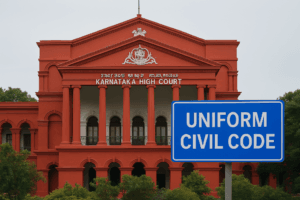Uniform Civil Code Boost: Karnataka High Court’s Bold Move Sparks Urgent Action – 5 Powerful Reasons It Matters
In a landmark judgment, the Karnataka High Court has strongly urged the Indian Parliament and state legislatures to implement a Uniform Civil Code (UCC) to uphold the constitutional values of justice, equality, and secularism. Justice Hanchate Sanjeev Kumar made this observation while ruling on a property dispute involving inheritance rights, where unequal treatment under Muslim personal law came into focus.
The court highlighted that while Hindu laws provide equal rights to daughters and sons, the same is not true for Muslim women, thereby violating Article 14 of the Constitution. Stressing the importance of Article 44, which envisions a UCC, the judge noted that differing personal laws across religions often result in injustice, especially for women. The ruling cited landmark Supreme Court cases like Shah Bano, Sarla Mudgal, and John Vallamattom to underline the longstanding need for a common civil framework. The judgment calls for urgent legislative action, emphasizing that true equality can only be achieved through uniform laws for all citizens.
The court has directed that its verdict be sent to top legal authorities at both state and central levels. Importantly, the civil court’s earlier decision awarding a one-fifth share in the joint family property to the deceased woman’s legal heir was upheld.

Uniform Civil Code Boost: Karnataka High Court’s Bold Move Sparks Urgent Action – 5 Powerful Reasons It Matters
In a landmark judgment, the Karnataka High Court has urged the Indian Parliament and state legislatures to prioritize the implementation of a Uniform Civil Code (UCC), emphasizing its necessity to achieve justice, equality, and secularism as enshrined in the Constitution. The court highlighted that differing personal laws across religions perpetuate inequality—particularly against women—and undermine the constitutional vision of a unified nation.
Key Observations from the Judgment
The ruling was delivered by Justice Hanchate Sanjeev Kumar on April 6, 2025, while resolving a family property dispute involving the legal heirs of Abdul Basheer Khan. The case centered on a claim by Sirajuddin Macci, representing his deceased wife, Shahnaz Begum, who was allegedly denied her rightful share in her father’s estate. The court noted that such conflicts often arise due to inconsistencies in religion-based personal laws governing inheritance, marriage, and divorce.
Justice Kumar emphasized that Article 44 of the Constitution, which directs the state to enact a UCC, remains unfulfilled even seven decades after independence. A UCC would replace fragmented religious laws with a common set of civil rules applicable to all citizens, irrespective of faith, ensuring uniformity in matters like inheritance, adoption, and divorce. The judge asserted that this reform is critical to realizing the constitutional ideals of justice, liberty, equality, and fraternity outlined in the Preamble.
Inequality in Personal Laws
The court contrasted inheritance rights under Hindu and Muslim personal laws. Under the Hindu Succession Act, daughters and sons have equal rights to ancestral property. However, under Muslim personal law (Sharia), daughters typically receive half the share inherited by sons. The judgment termed this disparity a violation of Article 14, which guarantees equality before the law. Justice Kumar argued that such discrepancies contradict India’s secular ethos and perpetuate gender-based discrimination.
The ruling also referenced historical debates during the drafting of the Constitution, noting that visionaries like Dr. B.R. Ambedkar and Sardar Vallabhbhai Patel had advocated for a Uniform Civil Code to foster national unity. The court cited Supreme Court precedents, including the Shah Bano case (1985), where the need for a UCC was first underscored to protect Muslim women’s rights, and the Sarla Mudgal case (1995), which highlighted conflicts arising from religious conversions to bypass civil laws.
Call for Legislative Action
The High Court directed the Registrar General to share the judgment with the Principal Law Secretaries of the central and Karnataka governments, urging them to act on Article 44. The court acknowledged that implementing a UCC is a complex and sensitive task requiring consensus but stressed that further delay would hinder progress toward constitutional equality.
Resolution of the Property Dispute
In the specific case, the court upheld a 2019 Bengaluru civil court verdict recognizing three properties as part of a joint family estate. Abdul Basheer Khan’s children, including Shahnaz Begum, were declared entitled to equal shares. The defendants had argued that the properties were self-acquired, not ancestral, but the court dismissed this, citing evidence of their joint family status. Consequently, Shahnaz’s legal heirs were awarded a one-fifth share.
Why a UCC Matters
The UCC aims to eliminate contradictions between religious laws and constitutional principles. For instance, while Hindu law has evolved to grant women equal inheritance rights, other communities still follow patriarchal norms. A unified code would standardize rights and duties, reduce litigation, and ensure dignity for all citizens. The court emphasized that secularism, as defined in India, does not mean religious neutrality alone but also the active promotion of equality and justice.
Challenges Ahead
Critics argue that a UCC could threaten cultural diversity and impose majority norms on minorities. However, the court clarified that the goal is not to erase religious identities but to harmonize laws with constitutional values. Justice Kumar stressed that a UCC would empower women across communities, aligning India with progressive democracies that prioritize individual rights over religious customs.
Conclusion
The Karnataka High Court’s ruling adds momentum to the long-standing debate over the UCC. While successive governments have hesitated due to political sensitivities, the judiciary has consistently highlighted its constitutional importance. As India strives to balance tradition with modernity, the UCC remains a pivotal step toward ensuring equality before the law—a vision articulated by the nation’s founders but yet to be fully realized. The ball now lies in the legislature’s court to transform this constitutional directive into reality.
You must be logged in to post a comment.